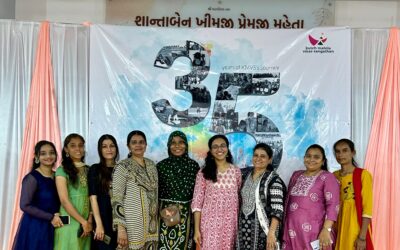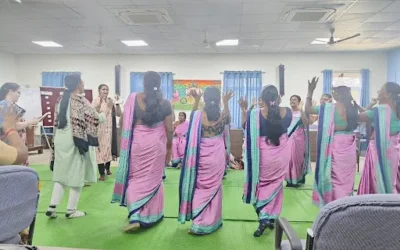An integral part of being an India Fellow is learning to lead a modest life by living and working along with communities without much luxury. However, the fellowship can be called an ‘elite’ program as most of us fellows come from positions of great privilege – urban, educated, born in upper class and caste. The eighteen months of fellowship journey is often a constant reminder of the positions of power and convenience we all come from.
This blog is a reflection on privilege check, co-written by 2021 fellows, Anushka, who is working with Chaitanya WISE in Ujjain, Madhya Pradesh and Shakshi at Kutch Mahila Vikas Sangathan (KMVS) in Kutch, Gujarat.
Anushka Writes
Growing up in an upper middle class family, my privilege made me take too many things for granted. Many would say that’s normal. But what happens when you suddenly shift to an environment devoid of a lot of facilities you grew accustomed to? You struggle, adapt and reflect. The experience of living at grassroots, while working with a non-profit, is making me acknowledge a bunch of these privileges since the last five months.
Don’t have a fridge at home? Get used to cooking daily so that the perishable items like milk and vegetables don’t go waste. Or find a person who will make tiffin for you.
Don’t have a bed at home? My first reflex was to buy a bed. On second thoughts, I realised that sleeping on mattresses isn’t such a big deal. These were, however, in my conscious mind, something my daily routine kept reminding me about. What went unnoticed was the lack of mirrors wherever I lived over these five months. Full size mirrors never felt like a luxury until I went home for a break, recently. I suddenly realised that I hadn’t looked at my full self in front of a mirror in months.
I had lost weight which suddenly became evident for the last time on observing myself in the mirror. My curves had deepened; I could fit into clothes on which I had given up. Of course, it led to excitement and happiness but over and above that, I was left with questions and thoughts that had never occurred to me before.


I never felt the need for a mirror in all these months for I believed that my physical appearance was not something that concerned me a lot. Never did I think of the role mirrors played in maintaining my mental well-being.
I talk to myself, a lot, and I love doing it in front of a mirror because it helps me see my vulnerabilities. It assists me in reassuring myself of being capable to overcome them. I have often found myself crying in front of the mirror, or comforting myself. These could be the traits of wanting to be an independent woman. It helps remind me that no matter what, I can be there for myself.
Somehow, it went unacknowledged and hence, the lack of mirrors went unnoticed all this while. Having a full size mirror is a luxury, which I can’t afford at this point. But I have started reminding myself to pause-admire-breathe-reassure, whenever I chance upon a mirror nowadays. And for talking to myself, I have settled for the smaller mirror in office, where I also live.
Shakshi Writes
Only when I stepped out of my comfort zone and challenged my prejudices, I was able to see what was evident and always existed around me. Now, one question continuously kept popping in my head. How could I never realise this? How could I not see all that I had. Probably because as Michael Kimmel quotes in his Ted talk, “That’s how privilege works. Privilege is invisible to those who have it.”
This realization struck when I met people, who were different from me, in terms of their lifestyle, appearance, socio-economic background and personal choices. These were the people I hadn’t interacted with earlier, and hence, I never observed their existence. As a fellow, I am working with people from slums in Gujarat. They have given me a perspective loaded with existential questions to self.
Coming from a middle-class family in a village of Rajasthan, I used to always believe that I was devoid of a decent lifestyle and facilities as compared to the city dwellers. However, it was only after meeting the girls and boys growing up here in the slums of Bhuj, that I realized how access to education and work opportunities took to me to places and people I could only imagine. I was so ignorant to see this until now.
Earlier, I used to think if one wants to study, they simply can! Education is the fundamental right and everyone gets it, isn’t it? So, why don’t people study? Maybe they lose interest or are just ignorant of its importance. Thanks to these adolescents from Bhuj, who helped me check my assumptions. When I lived with them closely, I realized that not everyone can access education easily. The government might have waived off the school fee or provided scholarship in government institutions but the situation at one’s home and the responsibilities they have, as a child, to support their family with income and/or labour, are a prominent factor too.
How can a young boy or girl think of studying when their family depends on them for daily allowances? How can they have the cognitive ability or mind-space to be interested in learning science, architecture, history or commerce when they know that their ration stock won’t last a month. In such cases, the obvious choice is to focus on something that brings immediate income. Only when your stomach is full, you have the energy to read and intelligence to choose.

Initially, I tried to motivate these boys and girls to pursue higher studies at college, or to complete high school (10th grade) at least. But when I went deeper into understanding their situation, I could clearly see that livelihoods is more important than education for them right now. They are correct on their part to go out and look for jobs rather than filling college applications.
Even if they get scholarships in government schools and colleges, who will feed their families? Expectations engulf their will to study and we see only a small representation of children from these communities in our educational institutions, and hence, workplaces. They make peace with what they get. If I was in their place, I would have done the same!




0 Comments